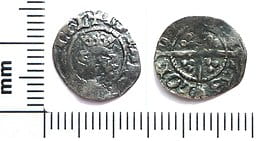I have found some additional material relating to an indictment I mentioned in Women in the Medieval Common Law,[i] though no conclusion. The indictment, from Middlesex, from 1385, related to a rape on Margaret. servant or maid (ancilla) of one Matilda Wherewell.[ii] It stated, on a night in 1385, Adam Matte, leprosus, had come to the house of Matilda Wherewell, in the parish of St Clements outside the bar of the old Temple in London, and bargained with Matilda to sleep with her that night,[iii] for 10 shillings. Matilda told Adam that she did not want to do this, but that she had a certain very beautiful servant called Margaret,[iv] who was lying in one of Matilda’s chambers, and he could sleep with Margaret if he paid Matilda the sum mentioned. Adam agreed and paid the money to Matilda. Straight afterwards, Matilda led him to the chamber where Margaret was lying. She told Adam he could do what he wanted, and locked the two in the room. Adam, feloniously, grabbed Margaret around the neck, threw her to the ground and raped her. Straight after this felony, because of the foulness of the rape, and Adam’s disease, Margaret became unwell, ‘losing her mind’, and continued in this state until she died, three days later. It was emphasised that Matilda had consented to, aided and abetted the commission of the felony.
Matilda’s first tactic, when she was tried in 1386, was to say that she should not have to answer this charge, since she was an accessory, and Adam, as principal, had not been convicted or outlawed. This worked, and Margaret was bailed to appear at future sessions. Later that year, another tactic emerged: flight. Her sureties were fined for failing to produce her,[v] and the sheriff of Middlesex was to track her down,[vi] and so it goes on until 1387,[vii] but then the trail fades away, and as is all too common, Matilda seems to disappear.
So what?
Well, I used it in the book to illustrate the reach of common law beyond principal offenders, to include those facilitating offences, and to note that this could make women amenable to prosecution as accessories, even when they were not regarded as capable of committing an offence as a principal. I think there is more here, though.
Prostitution/sex for sale
If the indictment is anything resembling the truth, it is an example of commercial sexual exploitation of an entirely unwilling servant – and perhaps a situation in which ‘prostitution’ seems a more appropriate term than ‘sex work’, with the element of at least some exercise of will which seems to be bound up in that latter term. The picture given is one of an unaware servant exploited by Matilda, for her own financial benefit, who is unconsenting to the point of having to be locked up in a room with her ‘client’.
‘Leper’ as sexual predator
The story also brings together ‘lepers’ and illicit sex, in a way which will chime in with other ideas about lascivious ‘lepers’, from polemic and literature. It also seems quite interesting from the point of view of regarding it as plausible that somebody with leprosy might be wandering around looking for sex in a highly populated area. I cannot claim expertise in medieval disease or response to it, but this strikes me as unexpected. If this was indeed a person with leprosy/Hansen’s disease, then the idea that Margaret might have contracted it from him in a few days is beyond unlikely. The idea that she might be traumatised and ‘lose her mind’ seems rather more plausible, given the circumstances, and the horror of this disease in medieval Europe.
Legal points
It is, as noted in the book, interesting to see a woman accused as an accessory to rape, though she could not be a principal. Matilda’s contribution to the rape is significant, according to the indictment. It would not have happened without her, it would appear.
Given the structure of the offence and indictment, Matilda’s argument about principal and accessory was logical enough. If the man accused did in fact have leprosy, or was thought to have it, however, could he have been prosecuted? I don’t think that common law procedure had a strategy for trying those with feared and contagious conditions like this. In a sense, a ‘leper’ might be the perfect principal for an exploitative employer like Matilda (or the version of Matilda suggested by the indictment) – one the common law would not touch.
GS
17/6/2021
(image, halfpenny of Richard II, courtesy of Wikimedia Commons)
[i] KB 9/167 m. 8 (IMG 17), mentioned at p. 126 of Women in the Medieval Common Law.
[ii] (The indictment looks like ‘Whorewell’, at least to those of us with very questionable eyesight. The materials discussed here show that it was ‘Wherewell’, however, and thus probably a simple geographical name, relating to Wherwell, Hants, rather than, as I had imagined, a sort of occupational designation/jeer, attached to a woman who appears to have been involved in selling sex, one way or another).
[iii] These terms are notoriously difficult to translate, perhaps impossible in terms of capturing the nuances. It is clear that this is about sex, not accommodation.
[iv] (Or, as the KB 27 version has it, a servant called Margaret Pulcheriman. Makes a difference, doesn’t it? The latter suggests the sort of ‘trade name’ which might be used by a sex worker, and would seem to relate the unwillingness to the state of the particular man, rather than to the more general unwillingness of a servant not generally selling sex).
